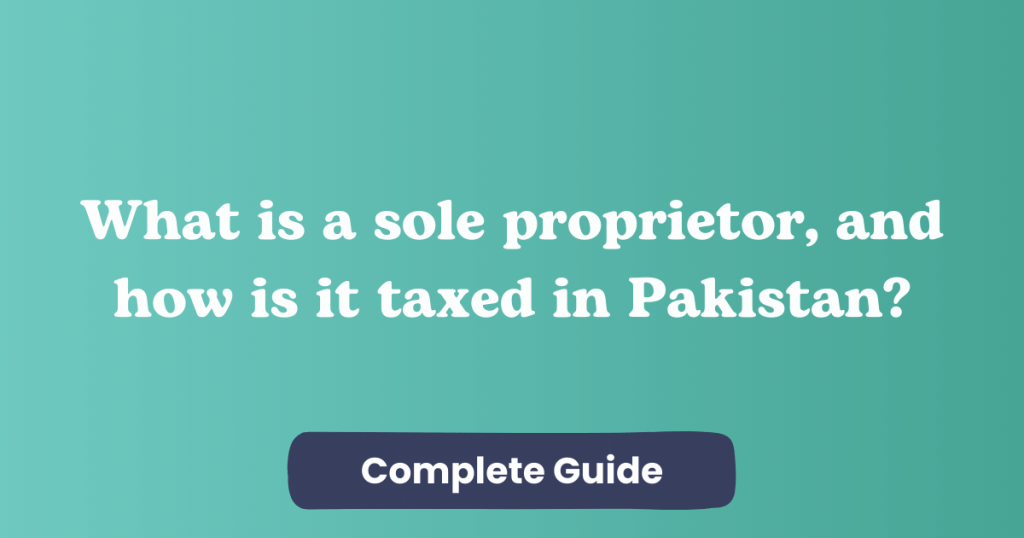
In Pakistan, the entrepreneurial spirit thrives through various business structures, one of the most common being sole proprietorship. This form of business ownership offers simplicity, flexibility, and autonomy to individual entrepreneurs. However, understanding how sole proprietorship is taxed, what it entails, and the necessary steps for registration is crucial for anyone venturing into this realm. Let’s get into the intricacies of sole proprietorship taxation in Pakistan and its practicalities.
Confused about sole proprietor taxes in Pakistan? Book a paid Zoom consultation with our experts for premium, personalized support and clear guidance!
Please contact us on WhatsApp if you need any instant assistance with taxation and secp services in Pakistan. You can also visit our Office in Karachi and Sukkur, or visit our website for more information.
Sole Proprietor Tax Calculator
What is Sole Proprietorship?
A sole proprietorship is a business structure where an individual operates and manages a business alone. It’s the simplest form of business entity, where the owner and the business are considered one and the same. Unlike corporations or partnerships, there is no legal distinction between the owner and the business.
Taxation of Sole Proprietorship in Pakistan:
Sole proprietorships in Pakistan are subject to taxation under the Income Tax Ordinance, 2001 amended upto 30th June, 2023. As per the ordinance, the income of a sole proprietor is taxed as part of their personal income. This means that any profits generated by the business are taxed at the individual’s applicable tax rate.
The tax rates for individuals in Pakistan vary depending on their income brackets, with progressive tax slabs ranging from 0% to 35%. Sole proprietors are required to file their income tax returns annually, declaring their business income along with any other sources of income they may have.
i) Income Tax Rate:
Tax rates are outlined under Section 5 of the Income Tax Ordinance, 2001 (amended up to 2023):
| Sr No. | Taxable income | Rates |
| 1 | Where the taxable income does not exceed Rs 600,000 | 0% |
| 2 | Where the taxable income exceeds Rs 600,000 but does not exceed Rs 800,000 | 7.5% of the amount exceeding Rs 600,000 |
| 3 | Where the taxable income exceeds Rs 800,000 but does not exceed Rs 1,200,000 | Rs 15,000 + 15% of the amount exceeding Rs 800,000 |
| 4 | Where the taxable income exceeds Rs 1,200,000 but does not exceed Rs 2,400,000 | Rs 75,000 + 20% of the amount exceeding Rs 1,200,000 |
| 5 | Where the taxable income exceeds Rs 2,400,000 but does not exceed Rs 3,000,000 | Rs 315,000 + 25% of the amount exceeding Rs 2,400,000 |
| 6 | Where the taxable income exceeds Rs 3,000,000 but does not exceed Rs 4,000,000 | Rs 465,000 + 30% of the amount exceeding Rs 3,000,000 |
| 7 | Where the taxable income exceeds Rs 4,000,000 but does not exceed Rs 6,000,000 | Rs 765,000 + 35% of the amount exceeding Rs 4,000,000 |
| 8 | Where the taxable income exceeds Rs 6,000,000 |
ii) Taxable Income Calculation:
The taxable income of a person for a tax year shall be the total income 1[under clause (a) of section 10] of the person for the year reduced (but not below zero) by the total of any deductible allowances under Part IX of this Chapter of the person for the year. as per section 9 of the Income Tax Ordinance, 2001.
iii) Filing Requirements:
- Sole proprietors must file annual tax returns by the due date, typically before the end of September.
- Section 114 of the Income Tax Ordinance, 2001 instructs about the filing of tax returns.
iv) Withholding Tax:
Payments made to sole proprietors may be subject to withholding tax.
v) Advance Tax:
- Sole proprietors may need to pay advance tax on estimated income during the tax year.
- Advance tax provisions are detailed in Sections 147 and 147A of the Income Tax Ordinance, 2001.
vi) Tax Deducted at Source (TDS):
- TDS applies to certain payments made by sole proprietors.
- Sections 149 to 158 of the Income Tax Ordinance, 2001 govern TDS.
vii) Tax Credits and Deductions:
- Sole proprietors can claim deductions for business expenses, depreciation, and investment tax credits.
- Deduction rules are provided under Sections 20 and 21 of the Income Tax Ordinance, 2001.
viii) Annual Income Tax Return:
Section 114 of the Income Tax Ordinance, 2001 requires sole proprietors to file annual tax returns, disclosing income, deductions, and taxes paid.
ix) Tax Audit:
- Tax authorities may conduct audits to ensure compliance.
- Section 177 of the Income Tax Ordinance, 2001 entails tax audit procedures.
x) Penalties for Non-Compliance:
- Penalties apply for late filing or non-payment of taxes.
- Section 182 of the Income Tax Ordinance, 2001 specifies penalties and interest charges.
Why Sole Proprietorship is Most Common in Pakistan:
Sole proprietorship is highly prevalent in Pakistan due to several reasons:
i) Ease of Establishment:
Registering a sole proprietorship is relatively simple and inexpensive compared to other business structures. This makes it accessible to a wide range of aspiring entrepreneurs, especially those with limited resources.
For instance you are eager to open a small clothing boutique. Instead of navigating the complexities of company registration, you can choose to operate as a sole proprietor. This decision enables you to swiftly launch your business and concentrate on building your brand.
ii) Low Start-up Costs:
Sole proprietorships typically require minimal initial investment, making them accessible to individuals with limited financial resources. In Pakistan, where many dream of entrepreneurship but face economic constraints, this affordability factor is particularly compelling.
Consider yourself, someone passionate about business in Pakistan. By opting for a sole proprietorship to start your business, you can keep your initial investment modest, without breaking the bank.
iii) Direct Control and Flexibility:
As a sole proprietor, you have complete control over your business decisions and operations. It allows you to quickly adapt to market changes and customer preferences which is a crucial advantage in Pakistan’s dynamic business landscape.
iv) Limited Liability:
Sole proprietors in Pakistan have unlimited personal liability, meaning they are personally responsible for all your debts and obligations of your business. While this lack of limited liability is a downside compared to other business structures, it can be seen as advantageous for you if you are confident in your ability to manage risks effectively.
v) Tax Benefits:
If you get started as a sole proprietor in Pakistan, you can enjoy certain tax advantages, such as the ability to offset business losses against other sources of income. This flexibility can result in significant tax savings for you if you operate businesses alongside your income-generating activities.
vi) Ease of Decision-Making:
If you become a sole proprietor, you’ll have the autonomy to make quick decisions without the need for extensive consultations or bureaucratic approvals. This agility is particularly valuable in fast-paced industries or emerging markets where timely responses to market dynamics can make or break a business.
vii) Local Market Knowledge:
As a sole proprietor, you know your local market inside out. This means you understand exactly what your customers want and need. With this knowledge, you can build strong relationships with your customers and stand out from bigger competitors. By focusing on what makes your community unique, you can offer products or services that meet their specific preferences, keeping them coming back to you instead of going elsewhere.
Cost and Process of Registering a Sole Proprietorship in Pakistan:
The cost of registering a sole proprietorship in Pakistan is relatively low compared to other business structures. The exact cost may vary depending on factors such as legal fees, documentation, and any additional licenses or permits required for specific industries.
To register a sole proprietorship in Pakistan, follow these general steps:
i) Choose a Business Name:
Select a unique name for your business that reflects its nature and identity.
ii) Obtain NTN (National Tax Number):
Apply for NTN from the Federal Board of Revenue (FBR) to fulfill your tax obligations. You can obtain NTN online or through designated tax facilitation centers.
iii) Register with SECP (Securities and Exchange Commission of Pakistan):
While sole proprietorships are not required to register with SECP, certain businesses may need to obtain specific licenses or permits from relevant authorities based on their nature of operations.
iv) Open a Bank Account:
Open a separate bank account for your business transactions to maintain financial transparency and facilitate accounting processes.
Documents Required for Sole Proprietorship Registration:
When registering a sole proprietorship in Pakistan, you typically need the following documents:
1) CNIC (Computerized National Identity Card) of the owner.
2) Proof of Business Address: Utility bills or rental agreements.
3) Bank Reference Letter: To open a business bank account.
4) NTN Certificate: Obtained from FBR.
5) Any Additional Licenses or Permits: Depending on the nature of your business.
Reference: IASBUserManual(Eng).pdf (punjab.gov.pk)
Conclusion:

Sole proprietorship provides a simple and cost-effective way for you to start and run your business in Pakistan. Understanding taxation, registration, and compliance is crucial for smooth operations and legal adherence. By following these steps and staying compliant with laws, you can embark on your entrepreneurial journey confidently. While planning, taxation might seem overwhelming but with the right knowledge you can leverage sole proprietorship to pursue your business goals and contribute to Pakistan’s economic growth.
